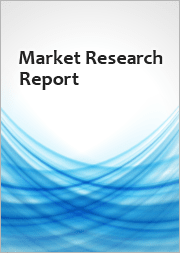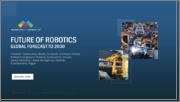
|
시장보고서
상품코드
1547268
군집 로봇 시장 조사 보고서 : 산업 분석, 규모, 점유율, 성장, 동향, 예측(2024-2032년)Global Swarm Robotics Market Research Report - Industry Analysis, Size, Share, Growth, Trends and Forecast 2024 to 2032 |
||||||
군집 로봇 시장의 세계 수요는 2023년 9억 2, 000만 달러에서 2032년에는 거의 107억 5, 000만 달러 규모에 이를 것으로 추정되며, 예측 기간 동안 복합 연간 성장률(CAGR)은 31.49%입니다.
군집 로봇 공학은 개미, 벌, 흰개미 등의 사회성 곤충이 나타내는 집단 행동으로부터 힌트를 얻은 로봇 공학의 하위 분야입니다. 이 분야에서는 복수의 로봇이 협조적이고 분산적으로 일하는 시스템을 설계, 연구하고 있습니다. 이 경우, 비교적 간단하고 종종 동종의 로봇 그룹(스웜이라고 함)이 분산되고 자기 조직화되며 종종 국소 상호 작용을 통해 작업 및 목적을 달성하기 위해 협력 합니다. 기본적인 개념은 복잡한 문제를 해결하고 단일 정교한 로봇보다 효율적이고 견고하게 작업을 수행하기 위해 집단에서 행동하는 많은 비교적 간단한 로봇의 힘을 활용합니다. 입니다.
시장 역학
군집 로봇 시장은 관련성과 응용성 증가를 강조하는 다양한 요인의 조합에 힘입어 빠르게 확대되고 있습니다. 이 시장의 주요 촉진요인으로는 비교적 단순한 로봇의 무리를 배치하는 것에 의한 비용 효과와 무리가 제공하는 견고성과 내장애성 등이 있습니다. 로봇의 수에 중복성을 갖게 함으로써 개별 유닛이 고장나도 전체적인 미션을 달성할 수 있기 때문에 군집 로봇 공학은 수색이나 구조와 같은 중요한 작업에 특히 적합합니다. 개별 로봇의 상호작용으로부터 복잡한 집단 행동이 생기는 창발동을 활용하여 창조적인 문제 해결과 적응성을 가져옵니다. 분산 및 분산 제어는 중앙 제어 장치에 대한 의존도가 낮아지기 때문에 군집 로봇 공학은 중앙 제어가 어려운 시나리오에서 실용적인 선택이 됩니다. 그 용도는 환경 모니터링, 정밀 농업, 수색 및 구조 임무, 연구 개발 등 다방면에 걸쳐 현재 진행 중인 기술의 진보와 규제 당국의 지원이 그 성장을 더욱 뒷받침하고 있습니다. 산업계, 연구자, 기술공급자 간의 협동으로 군집 로봇 공학의 다양한 분야로의 통합이 촉진되어 변혁 기술로서의 가능성이 부각되고 있습니다.
조사 보고서는 Porter's Five Force 모델, 시장 매력 분석 및 밸류체인 분석을 다룹니다. 이러한 도구는 업계의 구조를 명확하게 파악하고 세계 수준에서 경쟁의 매력을 평가하는 데 도움이 됩니다. 게다가, 이러한 툴은 군집 로봇 시장에서 각 부문을 종합적으로 평가할 수 있습니다. 스웜 로봇 산업의 성장과 동향은 이 조사에 전반적인 접근을 제공합니다.
시장 세분화
시장 세분화는 국가별 및 지역별 부문에 대한 상세한 데이터를 제공하여 각 제품 및 서비스의 타겟 계층을 파악하고 향후 비즈니스 기회로 이어질 것입니다.
플랫폼별
- 무인 지상 차량(UGVs)
- 무인 항공기(UAV)
- 기타
용도별
- 보안, 검사, 감시
- 지도 작성, 측량
- 수색 및 구조, 재해 구조
- 공급 체인, 창고 관리
- 기타
최종사용산업별
- 군 및 방위
- 산업
- 농업
- 헬스케어
- 기타
지역 분석
이 섹션에서는 북미, 유럽, 아시아태평양, 라틴아메리카, 중동 및 아프리카의 스웜 로봇 시장의 현재 및 미래 수요를 강조하는 지역 전망을 다룹니다. 또한 모든 주요 지역에서 개별 용도 부문 수요, 추정 및 예측에 초점을 맞추었습니다.
맞춤 요구사항이 있는 경우 Google에 문의하세요. 당사의 설문조사팀은 고객의 요구에 따라 맞춤형 보고서를 제공할 수 있습니다.
목차
제1장 서문
제2장 주요 요약
- 시장의 하이라이트
- 시장 현황
제3장 군집 로봇 산업 분석
- 소개 : 시장 역학
- 시장 성장 촉진요인
- 시장 성장 억제요인
- 시장 기회
- 산업 동향
- Porter's Five Forces 분석
- 시장의 매력 분석
제4장 밸류체인 분석
- 밸류체인 분석
- 원재료 분석
- 원재료 리스트
- 원재료 제조업체 리스트
- 주요 원재료의 가격 동향
- 잠재적 구매자 목록
- 마케팅 채널
- 직접 마케팅
- 간접 마케팅
- 마케팅 채널 발전 동향
제5장 군집 로봇 시장 분석 : 플랫폼별
- 플랫폼별 개요
- 플랫폼별 과거 및 예측 데이터 분석
- 무인 지상 차량(UGV)
- 무인 항공기(UAV)
- 기타
제6장 군집 로봇 시장 분석 : 용도별
- 개요 : 용도별
- 과거 및 예측 데이터 분석 : 용도별
- 보안, 검사, 감시
- 지도 작성, 측량
- 수색 및 구조, 재해 구조
- 공급망과 창고 관리
- 기타
제7장 세계의 군집 로봇 시장 분석 : 최종 이용 산업별
- 개요: 최종 이용 산업별
- 최종 이용 산업별 실적 데이터와 예측 데이터 분석
- 군 및 방위
- 산업용
- 농업
- 헬스케어
- 기타
제8장 군집 로봇 시장 분석 : 지역별
- 지역별 전망
- 소개
- 북미 매출 분석
- 개요 : 분석 및 예측
- 북미 : 부문별
- 북미별
- 미국
- 캐나다
- 멕시코
- 유럽 매출 분석
- 개요 : 분석 및 예측
- 유럽 부문별
- 유럽 국가별
- 영국
- 프랑스
- 독일
- 이탈리아
- 러시아
- 기타 유럽
- 아시아태평양 매출 분석
- 개요 : 분석 및 예측
- 아시아태평양 부문별
- 아시아태평양 국가별
- 중국
- 인도
- 일본
- 한국
- 호주
- 동남아시아
- 기타 아시아태평양
- 라틴아메리카 매출 분석
- 개요 : 분석 및 예측
- 라틴아메리카 부문별
- 라틴아메리카 국가별
- 브라질
- 아르헨티나
- 페루
- 칠레
- 기타 라틴아메리카
- 중동 및 아프리카 매출 분석
- 개요 : 분석 및 예측
- 중동 및 아프리카 부문별
- 중동 및 아프리카 국가별 일람
- 사우디아라비아
- 아랍에미리트(UAE)
- 이스라엘
- 남아프리카
- 기타 중동 및 아프리카
제9장 군집 로봇 기업경쟁 구도
- 군집 로봇 시장의 경쟁
- 제휴, 협력, 합의
- 합병 및 인수
- 신제품 발표
- 기타 개발
제10장 기업 프로파일
- 주요 기업의 시장 점유율 분석
- 시장 집중도
- Hydromea(Switzerland)
- Boston Dynamic(US)
- SwarmFarm(Australia)
- Swarm Technology(US)
- Sentien Robotics(US)
- Berkeley Marine Robotics(US)
- Swisslog Holding AG(Switzerland)
- Farobot Inc.(Taiwan)
- K-Team Corporation(Switzerland)
- Kion Group AG(Germany)
The global demand for Swarm Robotics Market is presumed to reach the market size of nearly USD 10.75 Billion by 2032 from USD 0.92 Billion in 2023 with a CAGR of 31.49% under the study period 2024-2032.
Swarm robotics is a subfield of robotics that takes inspiration from the collective behaviors exhibited by social insects like ants, bees, and termites. It involves designing and researching systems that utilize multiple robots working together in a coordinated and decentralized manner. In this, a group of relatively simple and often homogeneous robots referred to as a swarm, work together to achieve tasks or objectives through decentralized, self-organized, and often local interactions. The fundamental idea is to leverage the power of many relatively simple robots acting collectively to resolve complex problems and perform tasks more efficiently and robustly than a single, sophisticated robot could.
MARKET DYNAMICS
The swarm robotics market is rapidly expanding, fueled by a combination of diverse factors that highlight its increasing relevance and applicability. Key drivers of this market include the cost-effectiveness of deploying a swarm of relatively simple robots, as well as the robustness and fault tolerance they provide. Redundancy in the number of robots ensures that even if individual units fail, the overall mission can still be accomplished, making swarm robotics particularly suitable for critical tasks like search and rescue. It leverages emergent behavior, where complex group behaviors arise from the interactions of individual robots, leading to creative problem-solving and adaptability. Decentralized and distributed control reduces the reliance on a central controller, making swarm robotics a practical choice in scenarios where centralized control is challenging. Its applications span environmental monitoring, precision agriculture, search and rescue missions, and research and development, with ongoing technological advancements and regulatory support further driving its growth. Collaboration between industries, researchers, and technology providers is facilitating the integration of swarm robotics into various sectors, highlighting its potential as a transformative technology.
The research report covers Porter's Five Forces Model, Market Attractiveness Analysis, and Value Chain analysis. These tools help to get a clear picture of the industry's structure and evaluate the competition attractiveness at a global level. Additionally, these tools also give an inclusive assessment of each segment in the global market of Swarm Robotics. The growth and trends of Swarm Robotics industry provide a holistic approach to this study.
MARKET SEGMENTATION
This section of the Swarm Robotics market report provides detailed data on the segments at country and regional level, thereby assisting the strategist in identifying the target demographics for the respective product or services with the upcoming opportunities.
By Platform
- Unmanned Ground Vehicles (UGVs)
- Unmanned Aerial Vehicles (UAVs)
- Others
By Application
- Security, Inspection & Monitoring
- Mapping & Surveying
- Search & Rescue and Disaster Relief
- Supply Chain and Warehouse Management
- Others
By End Use Industry
- Military & Defense
- Industrial
- Agriculture
- Healthcare
- Others
REGIONAL ANALYSIS
This section covers the regional outlook, which accentuates current and future demand for the Swarm Robotics market across North America, Europe, Asia-Pacific, Latin America, and Middle East & Africa. Further, the report focuses on demand, estimation, and forecast for individual application segments across all the prominent regions.
The research report also covers the comprehensive profiles of the key players in the market and an in-depth view of the competitive landscape worldwide. The major players in the Swarm Robotics market include Hydromea (Switzerland), Boston Dynamic (US), SwarmFarm (Australia), Swarm Technology (US), Sentien Robotics (US), Berkeley Marine Robotics (US), Swisslog Holding AG (Switzerland), Farobot Inc. (Taiwan), K-Team Corporation (Switzerland), Kion Group AG (Germany). This section consists of a holistic view of the competitive landscape that includes various strategic developments such as key mergers & acquisitions, future capacities, partnerships, financial overviews, collaborations, new product developments, new product launches, and other developments.
In case you have any custom requirements, do write to us. Our research team can offer a customized report as per your need.
TABLE OF CONTENTS
1. PREFACE
- 1.1. Report Description
- 1.1.1 Objective
- 1.1.2 Target Audience
- 1.1.3 Unique Selling Proposition (USP) & offerings
- 1.2. Research Scope
- 1.3. Research Methodology
- 1.3.1 Market Research Process
- 1.3.2 Market Research Methodology
2. EXECUTIVE SUMMARY
- 2.1. Highlights of Market
- 2.2. Global Market Snapshot
3. SWARM ROBOTICS - INDUSTRY ANALYSIS
- 3.1. Introduction - Market Dynamics
- 3.2. Market Drivers
- 3.3. Market Restraints
- 3.4. Opportunities
- 3.5. Industry Trends
- 3.6. Porter's Five Force Analysis
- 3.7. Market Attractiveness Analysis
- 3.7.1 Market Attractiveness Analysis By Platform
- 3.7.2 Market Attractiveness Analysis By Application
- 3.7.3 Market Attractiveness Analysis By End Use Industry
- 3.7.4 Market Attractiveness Analysis By Region
4. VALUE CHAIN ANALYSIS
- 4.1. Value Chain Analysis
- 4.2. Raw Material Analysis
- 4.2.1 List of Raw Materials
- 4.2.2 Raw Material Manufactures List
- 4.2.3 Price Trend of Key Raw Materials
- 4.3. List of Potential Buyers
- 4.4. Marketing Channel
- 4.4.1 Direct Marketing
- 4.4.2 Indirect Marketing
- 4.4.3 Marketing Channel Development Trend
5. GLOBAL SWARM ROBOTICS MARKET ANALYSIS BY PLATFORM
- 5.1. Overview By Platform
- 5.2. Historical and Forecast Data Analysis By Platform
- 5.3. Unmanned Ground Vehicles (UGVs) Historic and Forecast Sales By Regions
- 5.4. Unmanned Aerial Vehicles (UAVs) Historic and Forecast Sales By Regions
- 5.5. Others Historic and Forecast Sales By Regions
6. GLOBAL SWARM ROBOTICS MARKET ANALYSIS BY APPLICATION
- 6.1. Overview By Application
- 6.2. Historical and Forecast Data Analysis By Application
- 6.3. Security, Inspection & Monitoring Historic and Forecast Sales By Regions
- 6.4. Mapping & Surveying Historic and Forecast Sales By Regions
- 6.5. Search & Rescue and Disaster Relief Historic and Forecast Sales By Regions
- 6.6. Supply Chain and Warehouse Management Historic and Forecast Sales By Regions
- 6.7. Others Historic and Forecast Sales By Regions
7. GLOBAL SWARM ROBOTICS MARKET ANALYSIS BY END USE INDUSTRY
- 7.1. Overview By End Use Industry
- 7.2. Historical and Forecast Data Analysis By End Use Industry
- 7.3. Military & Defense Historic and Forecast Sales By Regions
- 7.4. Industrial Historic and Forecast Sales By Regions
- 7.5. Agriculture Historic and Forecast Sales By Regions
- 7.6. Healthcare Historic and Forecast Sales By Regions
- 7.7. Others Historic and Forecast Sales By Regions
8. GLOBAL SWARM ROBOTICS MARKET ANALYSIS BY GEOGRAPHY
- 8.1. Regional Outlook
- 8.2. Introduction
- 8.3. North America Sales Analysis
- 8.3.1 Overview, Historic and Forecast Data Sales Analysis
- 8.3.2 North America By Segment Sales Analysis
- 8.3.3 North America By Country Sales Analysis
- 8.3.4 United States Sales Analysis
- 8.3.5 Canada Sales Analysis
- 8.3.6 Mexico Sales Analysis
- 8.4. Europe Sales Analysis
- 8.4.1 Overview, Historic and Forecast Data Sales Analysis
- 8.4.2 Europe By Segment Sales Analysis
- 8.4.3 Europe By Country Sales Analysis
- 8.4.4 United Kingdom Sales Analysis
- 8.4.5 France Sales Analysis
- 8.4.6 Germany Sales Analysis
- 8.4.7 Italy Sales Analysis
- 8.4.8 Russia Sales Analysis
- 8.4.9 Rest Of Europe Sales Analysis
- 8.5. Asia Pacific Sales Analysis
- 8.5.1 Overview, Historic and Forecast Data Sales Analysis
- 8.5.2 Asia Pacific By Segment Sales Analysis
- 8.5.3 Asia Pacific By Country Sales Analysis
- 8.5.4 China Sales Analysis
- 8.5.5 India Sales Analysis
- 8.5.6 Japan Sales Analysis
- 8.5.7 South Korea Sales Analysis
- 8.5.8 Australia Sales Analysis
- 8.5.9 South East Asia Sales Analysis
- 8.5.10 Rest Of Asia Pacific Sales Analysis
- 8.6. Latin America Sales Analysis
- 8.6.1 Overview, Historic and Forecast Data Sales Analysis
- 8.6.2 Latin America By Segment Sales Analysis
- 8.6.3 Latin America By Country Sales Analysis
- 8.6.4 Brazil Sales Analysis
- 8.6.5 Argentina Sales Analysis
- 8.6.6 Peru Sales Analysis
- 8.6.7 Chile Sales Analysis
- 8.6.8 Rest of Latin America Sales Analysis
- 8.7. Middle East & Africa Sales Analysis
- 8.7.1 Overview, Historic and Forecast Data Sales Analysis
- 8.7.2 Middle East & Africa By Segment Sales Analysis
- 8.7.3 Middle East & Africa By Country Sales Analysis
- 8.7.4 Saudi Arabia Sales Analysis
- 8.7.5 UAE Sales Analysis
- 8.7.6 Israel Sales Analysis
- 8.7.7 South Africa Sales Analysis
- 8.7.8 Rest Of Middle East And Africa Sales Analysis
9. COMPETITIVE LANDSCAPE OF THE SWARM ROBOTICS COMPANIES
- 9.1. Swarm Robotics Market Competition
- 9.2. Partnership/Collaboration/Agreement
- 9.3. Merger And Acquisitions
- 9.4. New Product Launch
- 9.5. Other Developments
10. COMPANY PROFILES OF SWARM ROBOTICS INDUSTRY
- 10.1. Top Companies Market Share Analysis
- 10.2. Market Concentration Rate
- 10.3. Hydromea (Switzerland)
- 10.3.1 Company Overview
- 10.3.2 Company Revenue
- 10.3.3 Products
- 10.3.4 Recent Developments
- 10.4. Boston Dynamic (US)
- 10.4.1 Company Overview
- 10.4.2 Company Revenue
- 10.4.3 Products
- 10.4.4 Recent Developments
- 10.5. SwarmFarm (Australia)
- 10.5.1 Company Overview
- 10.5.2 Company Revenue
- 10.5.3 Products
- 10.5.4 Recent Developments
- 10.6. Swarm Technology (US)
- 10.6.1 Company Overview
- 10.6.2 Company Revenue
- 10.6.3 Products
- 10.6.4 Recent Developments
- 10.7. Sentien Robotics (US)
- 10.7.1 Company Overview
- 10.7.2 Company Revenue
- 10.7.3 Products
- 10.7.4 Recent Developments
- 10.8. Berkeley Marine Robotics (US)
- 10.8.1 Company Overview
- 10.8.2 Company Revenue
- 10.8.3 Products
- 10.8.4 Recent Developments
- 10.9. Swisslog Holding AG (Switzerland)
- 10.9.1 Company Overview
- 10.9.2 Company Revenue
- 10.9.3 Products
- 10.9.4 Recent Developments
- 10.10. Farobot Inc. (Taiwan)
- 10.10.1 Company Overview
- 10.10.2 Company Revenue
- 10.10.3 Products
- 10.10.4 Recent Developments
- 10.11. K-Team Corporation (Switzerland)
- 10.11.1 Company Overview
- 10.11.2 Company Revenue
- 10.11.3 Products
- 10.11.4 Recent Developments
- 10.12. Kion Group AG (Germany)
- 10.12.1 Company Overview
- 10.12.2 Company Revenue
- 10.12.3 Products
- 10.12.4 Recent Developments


















